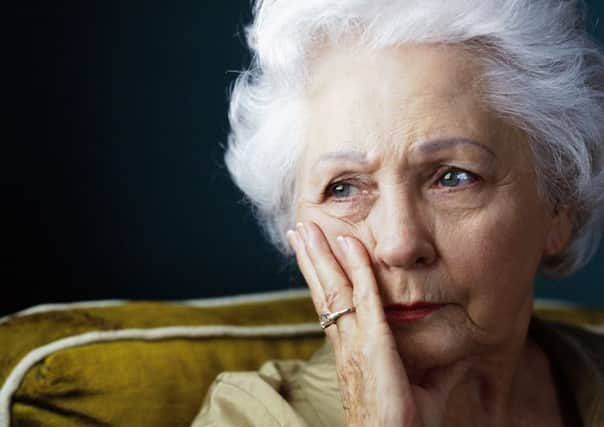Loneliness kills: experts say isolation can be fatal


Research published this month by Age UK found that one in six over-65s in Scotland – around 184,000 people – feel more lonely at Christmas than at any other time of the year. One in ten will be on their own on Christmas Day. And almost a quarter say they are not looking forward to Christmas at all.
This is why The Scotsman has launched a campaign this Christmas to tackle loneliness in the country, reach out to those who are alone at a time when others are celebrating, and support the work of charity Age Scotland.
Advertisement
Hide AdAdvertisement
Hide AdLoneliness can afflict people of any age, but a report by Dr Joanna Teuton, public health adviser at NHS Health Scotland, suggests the elderly are among the most vulnerable.
“There is consistent evidence to indicate that adults living alone and those who are widowed are at increased risk of severe loneliness. While estimates vary, data from the UK suggest that adults living alone are twice as likely to report severe loneliness compared with those living with others,” according to Dr Teuton’s report. “Estimates also suggest that widowed adults are around three times more likely to experience severe loneliness compared with married adults.”
There is also overwhelming scientific evidence that loneliness is not just an inconvenience, or a mild social problem for a few people in society. It is an epidemic in Scotland, and it is potentially deadly.
“We know that loneliness kills. It is a public health epidemic which is as dangerous to a person’s health as smoking 15 cigarettes a day. It increases the risk of stress, anxiety and depression and doubles the risk of dementia. Loneliness can occur at different ages and stages; however many of the triggers tend to be in later life due to life changes such as bereavement, retirement, moving to a new area, illness or children moving away from home,” says Age Scotland chief executive Brian Sloan.
“Christmas lays bare the extent of the loneliness epidemic. It is a particularly heartbreaking time for the tens of thousands of older people in Scotland who will sit down to dinner alone on Christmas Day, without family or friends to celebrate the festivities.”
Multiple surveys, including Age Scotland’s affiliated charity Age UK, show that there are more lonely older people than ever. This is partly because people are living longer, and Scotland’s population of older people is growing. Figures from National Records of Scotland predict a 23.2 per cent rise in the number of pensioners by 2043, equivalent to more than 240,000 older people.
But social changes may also be partly to blame. A YouGov survey for Age Scotland this year found that 60 per cent of people aged between 18 and 44 prefer to spend time using social media over visiting older friends, relatives or neighbours.
Scientists estimate that loneliness among older people increases the likelihood of death by 26 per cent. It has also been shown to be associated with an increased risk of developing coronary heart disease, high blood pressure, or having a stroke.
Advertisement
Hide AdAdvertisement
Hide AdThe mental health consequences are also profound. Lonely people are more prone to depression and anxiety, and face a 64 per cent increased probability of developing clinical dementia.
“It’s easy to feel helpless when faced with the scale of this problem,” Mr Sloan says. “But there is some great work being done by groups around Scotland, with volunteers giving up their time to reach out to those on their own.”
The Scotsman is asking readers to also help the lonely this Christmas. Details of what you can do are above on this page.